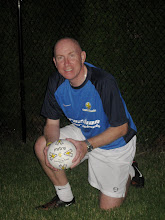From the Brazilian Soccer Schools perspective, the article highlighted many of the ideas that Simon Clifford has been preaching for 12 years now. For players to become successful in the game, they must be practicing more and more with the ball. Steve Bould the Arsenal youth team coach highlighted again that young English players are still behind young European players in terms of weekly training time..." "Its hard because I look at Spain, France or Holland and the kids are training four, five or six times per week at young ages at 15 we get ours three times a week (which includes a game) at the very most"
Consider now the young players in Canada, who may only train once or twice a week...at a low tempo, without a significant technical component and being taught by volunteer coaching staff who have not had the opportunity to spend time learning the game and what is best in terms of youth development. Therefore, when the players do train they may not be spending time on the correct training activities.
Steve Bould, the Arsenal coach, also highlighted an important component of youth development...character! For players to play at a higher level, they must learn how to overcome adversity and develop skills to overcome "problems". Daniel Coyle also highlighted this as an important aspect of a child's development in his book "The Talent Code". The struggle to master a new skill or to work out how to receive more touches in small sided games against older or more experienced players is a very important part of development.
No player will be able to instantly juggle the ball 300 times in succession without constant practice. It is the young players that keep practicing and have the belief in themselves that they can achieve a higher level of play....despite any obstacles or setbacks...who will ultimately be successful. That player may not necessarily be the best player today, they may have been told by a Rep coach that they are too small or not aggressive enough. If they keep working on their technical ability and have the determination and passion for the game to be successful...then these types of players will be our best players in future years.
If the young Brazilian players are spending 12-15 hours a week working on their ball skills and the young European players are training five or six times each week...Canada must adopt the same philosophy towards technical development if we wish to be truly successful in soccer.
I was asked this week when Canada would have a good national team. It is a question that I get asked very often. My answer was the same as always....2030! The majority of our Brazilian Soccer Schools players will be between 25-30 by then!
Read More on Arsenal's Youth Academy System
Read More on Arsenal's Youth Academy System






